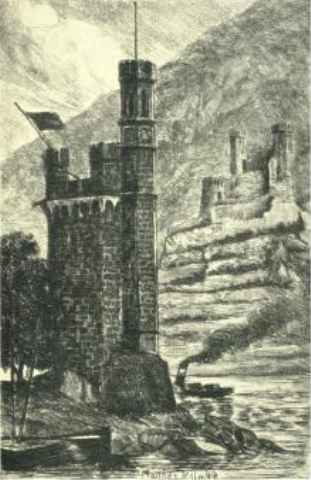Bingen
The
Mouse-Tower

Der
Mauseturm
Nach einer Radierung von Paul Matthes
Below Bingen in the middle of the Rhine there is a
lonely
island on which a stronghold is to be seen. This tower is called "the
Mouse-Tower". For many centuries a very gloomy tale has been told about
it
in connection with Hatto, Archbishop of Mayence, whose evil deeds were
well-known
throughout the country.
Hatto is said to have been ambitious, heartless,
and
perfidious, as well as cruel towards the poor. He extorted taxes from
his
people, tolls were imposed, and new burdens invented only to gratify
his
haughty pride and his love of display. On a little island between
Bingen
and Rüdesheim he caused a tower to be built, so that all
passing ships
could be stopped in the narrow passage, where they were obliged to pay
toll.
Soon after the building of this custom-house there
was
a very bad harvest in the country round Mayence. Drought had parched
the
fields, and the little seed remaining had been destroyed by hail. The
scarcity
was felt all the more, because the bishop had bought up all the stores
of
corn that were left from the year before, and had stored them up safely
in
his granaries.
A terrible famine now threatened the land,
spreading
misery among the poor. The unhappy people implored the cruel bishop to
lower
the price of the corn in his store-house, which he wished to sell at
such
exorbitant prices that his subjects could not buy it. All their
petitions
were in vain. His advisers besought him to have pity on the deplorable
condition
of the poor, but Hatto remained unmoved. When cries of distress and the
murmuring
voices of the exasperated folk were raised against their hard-hearted
master,
the bishop gave free vent to the wicked thoughts of his soul.
One day a troop of hungry beggars came crowding to
the
episcopal palace crying for food. Hatto and his guests were just
sitting
down to a luxurious banquet. The bishop had been talking to his
companions
of these wretched people, and had expressed his opinion that it would
be
a good thing to do away with them altogether in some drastic way.
As the ragged mob of men, women, and children,
with hollow
cheeks and pale faces threw themselves at his feet crying for bread, a
still
more fiendish plan suggested itself. Beckoning to them with
hypocritical
kindness he promised them corn, and caused them to be led outside the
town
to a barn, where each one was to receive as much corn as he wished. The
unhappy
folk hurried forth, their hearts full of gratitude; but when they were
all
in the barn, Hatto ordered the doors to be locked and the barn to be
set
on fire.
The screams of the poor wretches were
heart-rending,
and could be heard even in the bishop's palace.
But cruel Hatto called out scornfully to his
advisers,
"Listen! how the mice are squeaking among the corn. This eternal
begging
is at an end at last. May the mice bite me if it is not true!"
But the punishment which Heaven sent him was
terrible.
Thousands of mice came out of the burning barn, made their way to the
palace,
filled every chamber and corner, and at last attacked the bishop
himself.
His servants killed them by hundreds, but their numbers seemed only to
increase,
as did their ferocity also. The bishop was seized with horror and,
anticipating
God's punishment, he fled from the town and went on board a boat hoping
to
defend himself from his terrible pursuers. But the innumerable horde
swam
in legions after him, and when he reached his tower on the island,
thinking
at least he would be safe, there, the mice followed him, gnawing the
tower
and tearing for themselves an entrance with their sharp teeth, till at
last
they reached him whom they sought. The cruel man was devoured by the
mice,
which attacked him by scores. In his despair he offered his soul to the
Evil
One, if he would release his body from such awful agony. The Evil
Spirit
came, freed his body, but took his soul away for himself.
Thus runs the legend. History however speaks less
severely
of Hatto, the imperious prelate.
His great ambition was his desire of power. He was
the
founder of the temporal power which the seat of Mayence obtained, and
which
later on made it the first bishopric of the kingdom, but he was always
hated
by the citizens, who suffered much owing to his proud, despotic
character.
It is true that he was the founder of the toll
which
ships in olden times were obliged to pay on the Rhine, so that this
fact
and many other cruel exactions of his, have helped to evolve the
terrible
legend of the Mouse-Tower.
Click
 to go to the next
section of
the Legends of the Rhine to go to the next
section of
the Legends of the Rhine
|

